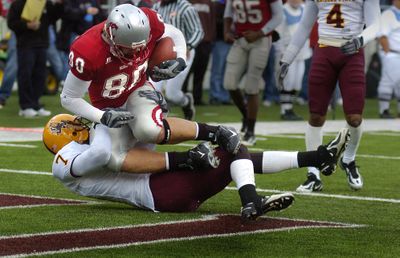WSU tight ends carry mature label
Life experiences help form group with little playing time

This is the second of nine position outlooks on the 2008 Washington State Cougars. Today we examine the tight ends. Coming Thursday: wide receivers.
PULLMAN – It’s an oxymoron for sure, but Washington State’s tight ends are the most experienced inexperienced group on the team.
Game experience? Not so much. Life experience? More than you can imagine.
Take the starter, Devin Frischknecht. After transferring from Snow College in Utah before last season, he caught just 18 passes for 191 yards, though he played in all 12 games. But the 21-year-old is mature beyond his years, living quietly in Pullman with his wife Kristen and their 20-month-old son Reggie.
Frischknecht isn’t even the elder statesman of the group. That title belongs to 26-year-old Ben Woodard, who graduated from Cheney High in 2001, spent two years on his Latter-day Saints mission in Central America, and has been married to Tracy for two years.
All that life experience carries over.
“Having that little extra maturity definitely helps as far as studying our plays and making sure we know our assignments and just working hard when we need to,” said Woodard, who has already earned an engineering degree and is actively job hunting for the end of the semester.
“That helps a lot, the maturity factor,” said Rich Rassmussen, the WSU tight ends coach. “All three of them have a sense of urgency. They all want to get better.”
The starter: Frischknecht earned the role in the spring, but he built the foundation in last year’s Apple Cup. Filling in early for an injured Jed Collins, Frischknecht caught five passes, including two touchdown tosses from Alex Brink.
“Devin, he’s very good when it comes to the passing game,” Rasmussen said. “He’s got great route-running ability, very good hands. (But) he’s still improving as a run-blocker. We’re still working on that, getting him to be more physical at the point of attack.”
The reserves: Though Frischknecht will be the only one announced before the game, the Cougars’ scheme calls for two tight ends often and three – one as an H-back, or motion man – at times.
Woodard, who had eight catches last season, is the first off the bench, followed when needed by junior Tony Thompson, who played sparingly last year in part because of injury.
“Ben is probably the most well-rounded of the three, the most consistent,” said Rassmussen, who first saw Woodard play as a high school athlete at EWU’s summer camps. “We’re still refining his pass blocking skills. He doesn’t have the speed the other two do, but he’s got sure hands … and he’s efficient in the passing game.
“Tony brings some athleticism to the table. He’s good in the passing game and he’s becoming more and more physical.”
The outlook: In the new Cougars offense, the tight ends are being asked to play a greater variety of positions, but their top priorities remain the same – clear space in the running game and catch passes when needed. The nuances of accomplishing those goals have been learned quickly.
“With their maturity, they all have the ability to take things from the meeting room and apply them quicker on the practice field, compared to younger guys,” Rasmussen said. “The tight end position is so difficult – it takes guys typically a year to really grasp it. You have all the route concepts, the run blocking schemes and there are a lot of calls.
“Lot’s of times young guys, their heads are just spinning.”
“The technique and the assignments, they are mostly the same,” Woodard said. “But it’s definitely fun being able to shift around, move around, be spread out a little bit.
“I hope we can gain the coaches’ trust and the team’s confidence, and play a bigger part in the team’s offense.”
So far they have.
“All three of those guys, we’re comfortable as an offensive staff with allowing them to line up in space and get out of the non-traditional tight end position,” Rasmussen said. “That allows us to open up the offense and to be less predictable.”